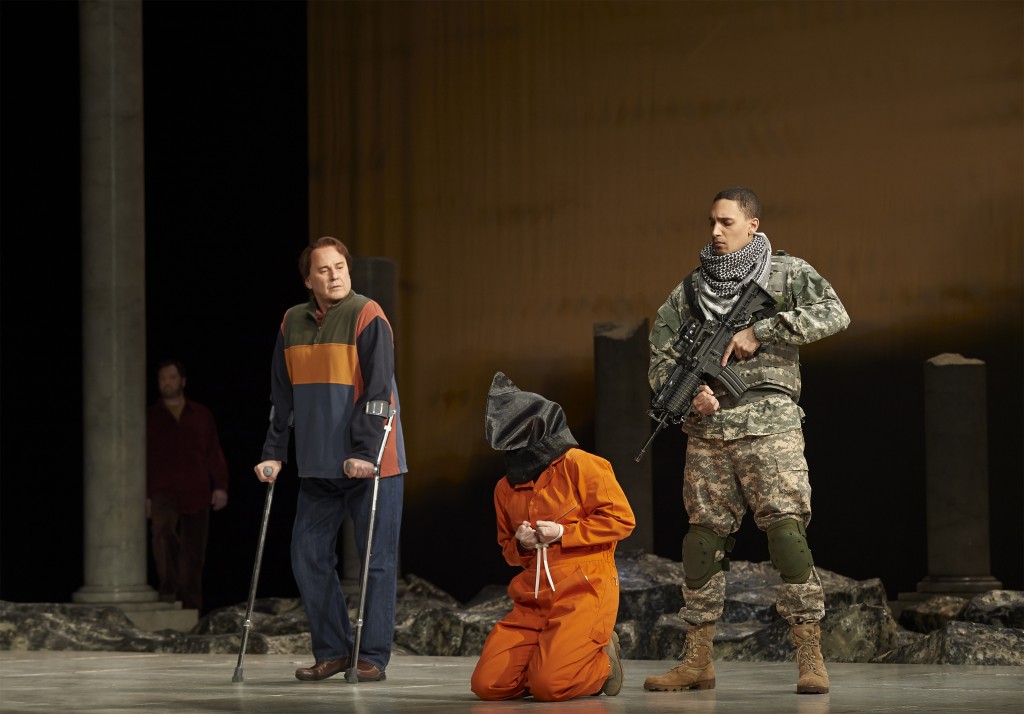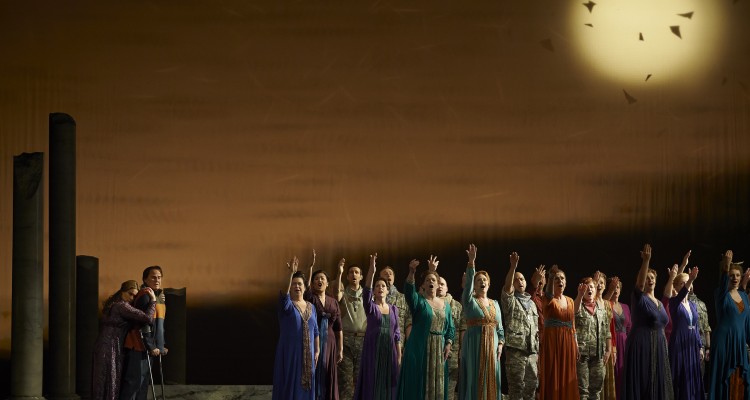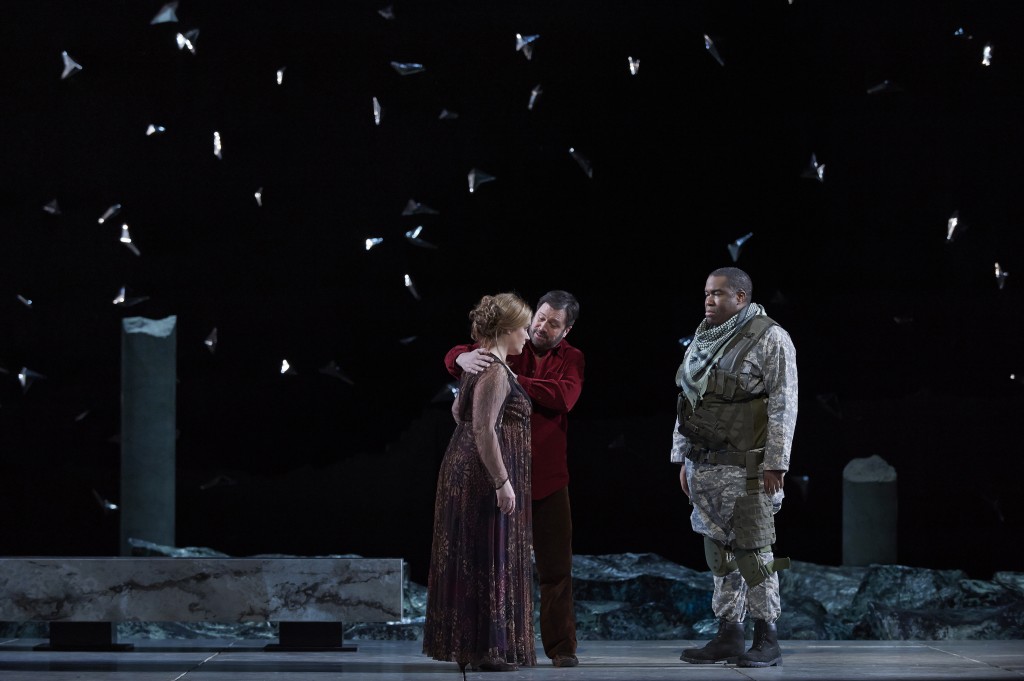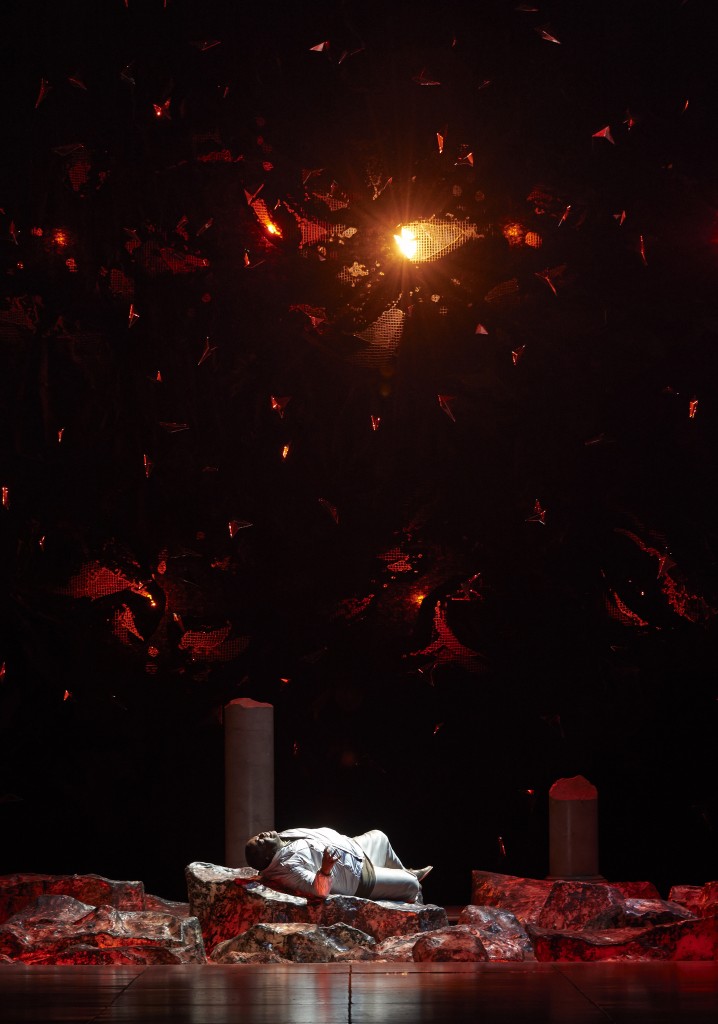Peter Sellars’ Hercules is an emotionally charged and poignant piece.

(l-r) David Daniels as Lichas (in background), Richard Croft as Hyllus, Lucy Crowe as Iole and Kaleb Alexander as Soldier in the Canadian Opera Company production of Hercules, 2014.
Sophocles, the Greek tragedian was also a Military official of high rank in his time. No wonder then, he was able to create honest, lasting works of sadness. In Women of Trachis, Sophocles chose to create a story that points out the trauma that the people, often women, went through at home while their husbands and sons were at war. George Frideric Handel, the famous Baroque opera composer, then took the premise of that story and reworked it into a libretto with three acts. Peter Sellars then comes along and condenses his Hercules into two emotionally charged acts.
Sellars’ piece is wonderful in its conceptualization because it showcases the patchwork of emotions that those left behind go through in the absence of their loved ones. It then showcases the way each party treads a thin line upon the return of the soldiers now participants in the horrors of war. The reunions can often be a fractured, delicate web that each person has to navigate. In this story, we see various points of view, all troubled and troubling in their own ways.
Hercules’ wife Dejanira, played expertly by mezzo-soprano Alice Coote, takes us through her stages of grief, at first (“…disconsolate his absence she laments…”), then upon learning he will return to her she sings (“Begone my fears”), to later cursing her emotionally absent spouse and instructing him to (“Resign thy club”) and return to the life he is living with her and his duties to their household. Coote has several lengthy arias and her legato passages require expert breath control, yet she never stumbles, never misses a beat. Her fiery outbursts fully display the turmoil that she lives through as a wife of war.
Hercules, the world’s strongest man, unbeatable on the battlefield is mentally broken once home. He is faced with the fact that all soldiers must reintroduce themselves and assimilate back into domestic lives. How does one do that? Hercules doesn’t know how to just ‘be’. Who is he when not in battle? Brooding and uncommunicative, what does one say to his estranged, jealous wife and his captive love interest?
Eric Owens, a bass-baritone plays the titular role and his lower register is fitting for the son of a god. Owens doesn’t have nearly as much to sing as the women, but in this story it works perfectly. When you think of the men and women who come back from war, what words are there to describe the horrors that they have committed, seen and been through? When Owens does sing, he makes each note count and his booming voice hits you square in the chest. His prostrate position in his death scene and the fact that he continued to belt out heartfelt song was inspired.
Iole, Hercules’ prisoner of war, (sung by soprano Lucy Crowe) further complicates things for an already tense homecoming. When she appears on stage, she is shackled, in a bright orange prison jumpsuit, her face hooded with a black cloth. After all the horrors of war that Iole witnesses—the massacre of her countrymen and the assassination of her father at the hand of Hercules, she finds it within herself not to despair but to sing for liberty (“Daughter of gods, bright liberty!”). Sellars’ decision to have Crowe sing while hooded makes Iole’s words even more significant, reminding people that even when at our lowest, we must still strive and hope for liberty.
Rounding off the cast in this production is counter tenor, David Daniels as Lichas – Hercules’ dear, helpless friend who works to console Dejanira and calm Hercules with little success. Richard Croft as Hyluus, a son in his father’s shadow, uses his rich tenor to convey the plethora of emotions that he struggles with throughout. The chorus is solid and powerful, even if their costumes and gesturing are sometimes distracting.
An odd choice to me was having Hercules clearly returning to America, yet George Tsypin’s set represents some sort of ancient Greece or Hades. Aside from that, the setting is very well done and the lighting by James F. Ingalls is some of the best I’ve seen in some time.
In Hercules the same lines are sung repeatedly and to some, it can be off putting at first, but what it does, upon reflection, is show you how deeply each word, each line of their stories, affects each player. It becomes pervasive. The beauty in it, is that there are subtle nuances each time the lines are sung as the characters navigate their way through murky waters.
How ironic, that Hercules, the strongest man in the world, should overcome every battle, only to return home and perish, in anguish (a fiery inferno of a death) at the hands, not of an enemy, but of a desperate loved one. His death scene in particular is particularly heartbreaking. Tsypin’s set here is at its finest. The boulders glow a bright reddish-orange, and the red lighting of the stage evokes thoughts of the pits of Hell. It is horrifying and it is haunting.
My biggest issue, and what I wish were different, was if Sellars had opted to drape a Canadian Flag over Hercules’ casket at the end of the opera. Our soldiers are often overlooked on the world stage yet we have our fair share of men and women who have done just as much in any war.
I would be remiss not to mention the stark reality of a soldier suffering from PTSD shooting his fellow soldiers in Texas last week. With that story in mind, you can’t help but draw the parallels to this story and the stress that all soldiers come home to. Loved ones that you haven’t seen in what is sometimes, years, who you are supposed to connect with. And having lived through the traumas of war, how could the soldier ever be the same man or woman that left?
There is something beautiful in baroque opera and composer Harry Bicket, clearly a master at his craft, leads his orchestra beautifully from start to finish with each note. Couple that with Handel’s arias which are engaging and soul piercing, and a stellar cast, this Hercules is an opera not to be missed.
Hercules runs through Apr. 30 at the Four Seasons Centre for the Performing Arts, 145 Queen St. For more info please visit: COC.




Leave a Reply